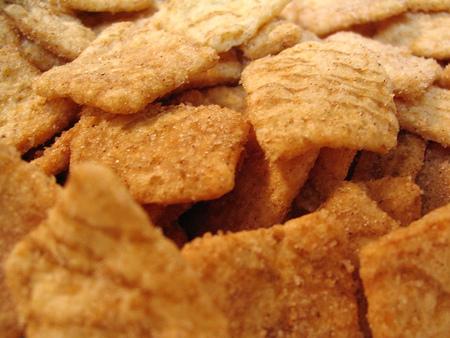9. Avoid food products with the wordoid “lite” or the terms “low fat” or “nonfat” in their names.
I get these rules, for the most part. As Pollan points out, "only the big manufacturers have the wherewithal to secure FDA-approved health claims for their products, and then trumpet them to the world. Generally it's the products of modern food science that makes the boldest claims." Sure. That checks out to me.
Which is not to say that I haven't been tempted. Many a time I've walked down the cereal aisle, picked up a box of Cinnamon Toast Crunch and thought, "Look! It says 'made from whole grain' right on the box. It's totally healthy! JUST BUY IT!"
At moments like these I have to take a step back and think to myself, "Leigh. Look at it. It's Cinnamon. Toast. Crunch. That's all you need to know. Put it back on the shelf and step away from the processed sugar-bomb."
("But... but... 'heart-healthy'...")
I'm also mostly okay with the no no-fat rule, because, as Pollan points out, "Removing fat from foods doesn't necessarily make them non-fattening." I've been hip to the whole swapping-sugar-for-fat trick for longer than I've been able to shop for myself.
"Mommy, mommy," said little Leigh, "It says low-fat - it's good for you! Why can't we buy it?"
"Because, sweetie, that just means it has more sugar."
So I'm down with the low-fat/no-fat moratorium, with the obvious exception of, you know, dairy products like milk, cheese, and yogurt. I mean, that just goes without saying - you're not going to make me drink whole-fat milk and eat whole-fat yogurt, are you Michael Pollan? Because that would be awful. And what's the harm of buying cheese made with 2% milk? That just seems healthy to me.
Except, actually, Pollan calls out yogurt specifically. "Check out the label on low- and nonfat yogurts," he says. "They typically contain more sugar per ounce than soda."
This is utterly devastating news, as I really, really love Stonyfield Farms' nonfat vanilla yogurt.
I was also kind of surprised to read Pollan's indictment of yogurt. Why didn't I notice that? I thought to myself. I'm usually so good about not getting conned by high-sugar "health foods." So I checked out the Stonyfield Farms labels again: their nonfat French Vanilla yogurt indeed has 25 grams of sugar, which, admittedly, is a lot a lot of sugar. But it is still less than eight ounces of soda. (side note: holy sh*t! An eight oz. Coke has 27 grams of sugar!?!? I think I got diabetes just from reading that label). And it is also less than the 29.9 grams the full-fat version of Stonyfield's French Vanilla contains, along with a whopping 230 calories, compared to the 140 calories in the nonfat version.
What the hell, MP? Am I missing something? It seems clear to me that the nonfat version is the better choice.
But you know what? Whatever. These are your rules, it's your book. And my plan was to follow your rules, not make up my own rules about which ones of yours make sense. And I know that may seem blisteringly pedantic, and in real-life I probably would have said to myself, "Psh, forget that," but for the purposes of this project, we're gonna go with it.
Besides, 25 grams of sugar is still a lot of sugar, no matter what you're comparing it with.
But here is where I will make an exception: when it comes to plain yogurt, skim milk, and other dairy products where sugar is obviously not being added, I'm still going to pick the low- or nonfat option. I just can't think of a reason not to. And it's better this way: now I'm compelled to buy nonfat plain yogurt and sweeten it myself with honey, thus following another rule (Number 37 - Sweeten and salt your food yourself) in the process. A win-win.

No comments:
Post a Comment